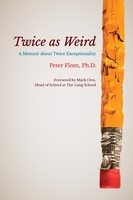Lots of people try to diagnose the dead and the famous. “Did XXX have YYY?” questions are all over the place, as are more assertive statements that, in fact XXX did have YYY. Given how hard it is to diagnose people, even if the person is not only alive but being seen by a qualified professional over several hours, how can we diagnose the dead and famous?
We can’t. And we do ourselves and our children and the whole special needs movement a disservice when we try.
Why do I say this? First, we may simply be wrong.
Googling “Did Einstein have learning disabilities?” brings up 200,000 hits, many of them. However, as Meg Heron-Blake points out he didn’t.
Second, we demean the process of evaluation. It’s one thing to diagnose someone like Einstein; of course Einstein is dead, but he at least was alive relatively recently. But people are wiling to diagnose others who are long dead. Leonardo Da Vinci famously wrote in mirror script. People use this as evidence that he was dyslexic. If you tried, today, to diagnose someone based on one characteristic, you would be laughed at, and justly so. Even if the person is alive and well, though, it is wrong-headed to try diagnose them based on seeing them on TV. I recently saw someone ask “Does Mitt Romney hae Asperger’s Syndrome?” based, apparently, on his awkwardness in public. Romney (regardless of what you think of his politics or his business), got millions of people to vote for him and, earlier, was a very successful businessman; these are hardly the signs of someone who has social problems. But, even ignoring that, this was again a diagnosis based on one trait.
Anyone who has gone through psychological testing, had their kid undergo it or studied it (or, like me, all three!) knows that it is a long and painstaking process and is not based on any single trait.
Third, even if we are correct, so what? There are surely some dead and famous people who do have Asperger’s or autism or NLD or whatever. So? I think the usual reason for diagnosing the dead and famous is to use those people as exemplars of people with AS or NLD or whatever. But this gets to one of the things not to say to LD people or their parents. The best exemplars of people with LD are not the superstars but the ordinary people.



Yeah.
We don’t even know what Jean-Paul Marat’s skin condition was for sure, or what the plague in Athens was that started in 430 BCE and which the historian Thucydides actually caught and then described in detail so that doctors in the future could find out what it was.
Also, I think diagnosing dead people according to cultures/diagnostic systems that they didn’t live under is kind of…enh. (In college I did an independent study on mental illness in ancient Greece and Rome…and learned real quick that “mental illness” wasn’t a concept their medical system had. Like, a lot of things we might call “mental illness” had lots of physical diagnostic criteria that you wouldn’t find in the DSM).